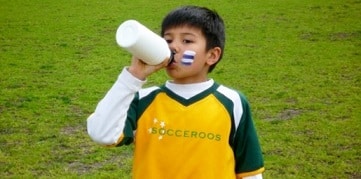 Childhood obesity is becoming a global problem. Children are eating more and more fast-foods and exercising less and less as the world becomes more digitised and they become more sedentary. Television and computers have taken over and children are spending up to six hours per day in front of one or the other instead of playing outside or doing sports or some other form of exercise.
Childhood obesity is becoming a global problem. Children are eating more and more fast-foods and exercising less and less as the world becomes more digitised and they become more sedentary. Television and computers have taken over and children are spending up to six hours per day in front of one or the other instead of playing outside or doing sports or some other form of exercise.
A study published in “The Journal of Paediatrics” in 2005 found that girls aged 9-11 who spent more than two hours a day in front of the television were 2.6 times more likely to be overweight than those who watched less.
Lack of exercise, parental work schedules that have all but destroyed family mealtimes, junk food and various other factors have seen the obesity prevalence in children and adolescents in the UK ncreased from 1995 to 2007 from 3.1% to 6.9% among boys, and 5.2% to 7.4% among girls between 1995 and 2004, and if trends continue the same way, the projected figures for 2015 are very high.
[Source: Journal of Epidemiology & Community Health]
The latest health survey done in England in 2010 has shown that 30.3% of children (aged 2-15) were overweight or obese. 16% of all children were obese. [Source: Facts and figures on obesity, Dept of Health, April 2012]
Part of the problem is a taste for junk food (high in fast carbohydrates and fat), part due to declining compulsory sport at school, part due to lack of sleep, and part genetic. According to a new study done by Leeds Metropolitan University involving in excess of 13,000 Leeds schoolchildren, children living in middle-affluent areas had the greatest probability of being obese. [Source: Leeds Metropolitan University; Childhood obesity is not at its highest in the most deprived areas of the UK, 2013.]
Fight off Adolescent Obesity with Water
Children are still growing, therefore putting them on a diet is not the ideal, and one should rather concentrate on weight maintenance or a reduction in weight gain. This can be done in various ways, and drinking water is one of them:
- Drinking water regularly promotes healthy hydration which can contribute to the maintenance of a healthy body weight
- Drinking water is great, but healthy hydration habits are not only about how much water we drink but also the quality of the water
- Drinking water is calorie-free, so the children can drink as much as they like
- If you encourage your children to drink water rather than beverages with added sugar, they will be healthier all round, have less visits to the dentist, and will not gain weight – in actual fact they will actually lose weight if they drink a glass of water before each meal.
- According to a report from the Johns Hopkins Bloomberg School of Public Health that was published in the American Journal of Public Health, telling children how many calories sweetened beverages contain will encourage them to drink less sodas and more water
- A study conducted at a corner store showed that providing children with caloric information and telling them how many kilometres they would need to run to work off the calories they consumed in that one drink led to a 50% decrease in them choosing a sweetened beverage over drinking water
- specific caloric information on the labels of sugary drinks with a physical-activity equivalent (how much exercise it will take to burn off said calories) will reduce the consumption of those drinks and increase the consumption of drinking water
- Drinking cold water makes the body expend energy to warm it, which is great for weight-loss and maintenance
Drinking water regularly will also automatically keep your children hydrated, which means that they will be healthier, have more energy, sleep better, and their body will function at peak levels. Obesity comes with a whole slew of problems and potential health hazards, so keeping your children from becoming obese is vital.
Investing in a water cooler at home as well as an office water cooler will provide both you and your children with easy access to chilled drinking water as and when required. This alone will encourage both you and your children to drink more water because it is chilled, tastes really good and everyone gets a kick out of dispensing a drink.
Rent a water cooler or purchase water dispensers for your home or office.
Source:





